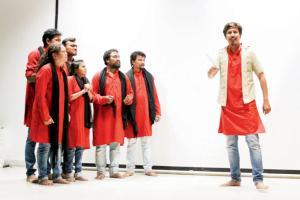At a new Mumbai Local session, writer and activist Dakxin Chhara will talk about a de-notified, stigmatised tribe that found catharsis through theatre

Budhan Theatre performs Girgit, an adaptation of Anton Chekhov's The Chameleon, which talks about hate politics
It's tough to be an antagonist in a play, especially, when you loathe the character. But if you can't convince yourself, will you be able to move an audience? Theatre actor Dakxin Chhara faced a similar conundrum 21 years ago, when he took on the role of Ashok Roy, a tainted officer involved in the custodial death of Budhan Sabar. Sabar was a member of the Kheria Sabar community, a de-notified tribe (DNT), i.e., tribes that were originally listed under the Criminal Tribes Act of 1871, in Purulia, West Bengal, who had been arrested in February 1998, on the charge of robbery.
Chhara himself belongs to a DNT, the Chharas, who hail from Chharanagar in Ahmedabad. Playing Roy, however, was not as significant as the fact that Chharanagar, which had lived with the stigma of being a criminal hell-hole, was on the brink of scripting history. On August 31, 1998, the anniversary of the de-notification, Chhara and his team, performed their first play under a newly-formed theatre group, Budhan Theatre - named after Sabar - in their town.
ADVERTISEMENT

Dakxin Chhara
"Several people attended the performance. For the first time, influential thinkers including Ganesh Devy, Mahasweta Devi, Romila Thapar and Gayatri Chakravorty Spivak came to Chharanagar," recalls Chhara. "In fact, after the show, Mahasweta Deviji refused to allow me to touch her feet, because she hated Roy, and I had played the part so convincingly, she needed time to separate the character from me."
It was this play that set the ball rolling for a new kind of activism in Chharanagar, in which residents used the performing arts to address the hate campaign against them. Over 48 productions and 1,700 shows later, Budhan Theatre has taken on a different hue, functioning as a pressure group.
"Theatre," says Dakxin, "is our catharsis, our dialogue with society and the system. It has helped us express our anger, and move away from violence, and towards social and political change."
Chhara will be speaking at a Mumbai Local event this week, where he will share the origin of his theatre group, its challenges and its unique theatre-making. "In the 1980s and early '90s, almost every man in Chharanagar was a robber, while women sold illicit liquor. But the residents had collectively decided they didn't want the next generation to be part of the same business. They wanted to bring about change and were educating their children in the only government school in town."
But the stigma was so overbearing that nobody wanted to see the Chharas through any other lens. "Not all the crimes that took place in the city were necessarily committed by the Chharas. But we had become easy targets. In front of my eyes, I've seen so many innocent people from my community being picked up and booked under serious charges."
Budhan Theatre helped them start a conversation. "For the first time, locals understood the power of art. Our theatre was not a project. It came from experience, from anger, from our own history and the inhuman treatment we faced."
The first 10 years, the group only did plays that revolved around DNTs. "But after 2008, we realised we needed to open up to other minority and marginalised communities, because we alone were not being oppressed. We started with an adaptation of [Dario Fo's] Accidental Death of an Anarchist, in which the protagonist was Muslim." Today, having trained over 350 people, the group is sowing the seeds of activism among everyone.
On July 26 last year, when the police pulled sleeping residents out of their homes and assaulted them, to flush out a few goons from Chharanagar, who had allegedly assaulted a police sub-inspector, the residents reacted not with violence, but with performance. "The next day, we organised a besana [mourning session], where our women beat their chests and grieved in front of a white shroud, which represented the death of law and order. We were angry, but we reacted constructively."
WHERE: MCubed Library, Bandra West
WHEN: March 2; 11 AM
RSVP: bookmyshow.com
Catch up on all the latest Mumbai news, crime news, current affairs, and also a complete guide on Mumbai from food to things to do and events across the city here. Also download the new mid-day Android and iOS apps to get latest updates
 Subscribe today by clicking the link and stay updated with the latest news!" Click here!
Subscribe today by clicking the link and stay updated with the latest news!" Click here!







